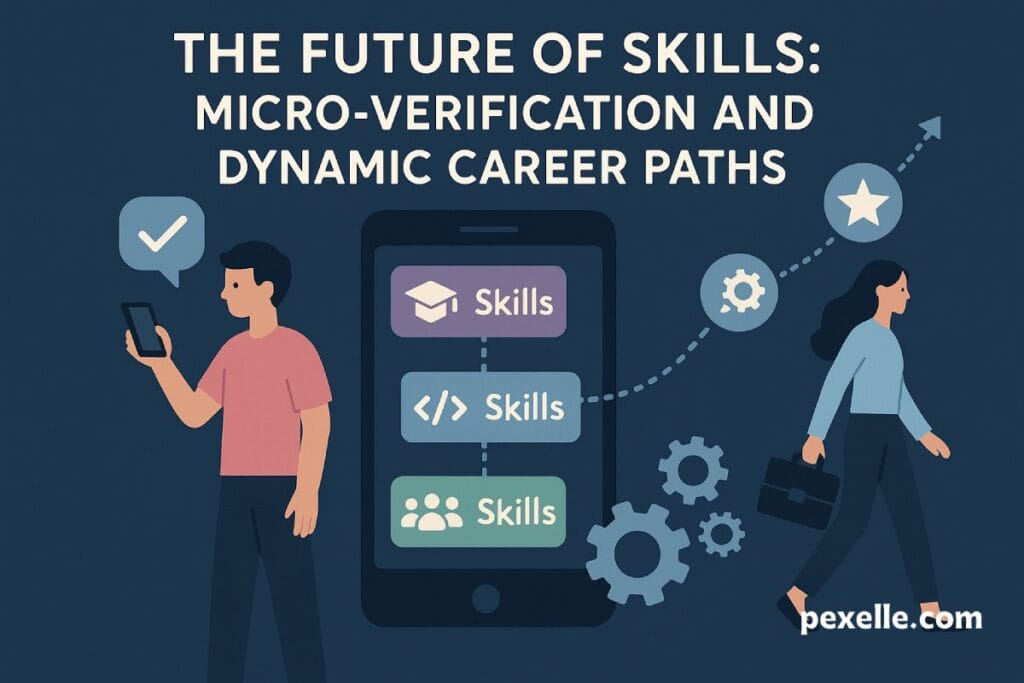The Future of Skills: Micro-Verification and Dynamic Career Paths

1. The End of the Credential Monopoly
For decades, traditional degrees and certificates have acted as the gatekeepers of opportunity. Employers relied on diplomas, job seekers chased formal credentials, and entire industries were built around paper qualifications. But that model is breaking.
Why? Because credentials don’t guarantee skills.
In today’s fast-moving world, having a degree in computer science from ten years ago doesn’t mean you can build a modern AI pipeline today. What matters is what you can actually do now, not what you did years ago. This is where micro-skills come in: small, verifiable units of ability that can be demonstrated, measured, and continuously updated.
2. Micro-Skills: Precision over Prestige
Micro-skills break down complex capabilities into atomic, trackable competencies. Instead of saying “I’m a software engineer,” a candidate can prove specific skills like:
- Building REST APIs with Express.js
- Optimizing database queries in PostgreSQL
- Creating responsive interfaces with Next.js
This level of precision changes the power dynamic:
- Employers no longer need to “guess” what a candidate can do.
- Candidates no longer depend on institutions to validate them.
- Skills become dynamic assets, not static labels.
Micro-skills don’t replace degrees entirely — they make them irrelevant when they stop being useful. That’s a brutal but accurate shift.
3. Dynamic Career Paths: Skills as Living Data
Traditional careers were linear: get a degree → get a job → climb the ladder. That’s dead. The modern world runs on modular, fluid careers. People build new skill clusters, pivot industries, or even monetize niche expertise globally.
Dynamic career paths rely on three pillars:
- Real-time skill mapping – What you know and can do is updated as you grow.
- Adaptive opportunities – Jobs find you based on what you can do now, not your history.
- Data-driven evolution – Your profile evolves as your skill set evolves.
Platforms like Pexelle are built to treat skills like a living graph, not a static CV. Instead of showing employers a single page of text, candidates present an ecosystem of abilities that updates itself.
4. AI as the Skill Validator
Here’s the hard truth: self-declared skills mean nothing. Employers don’t trust them — and they shouldn’t. That’s where AI-powered verification changes the game.
By analyzing real outputs — code, design artifacts, language performance, problem-solving traces — AI can:
- Evaluate micro-skills objectively
- Detect inconsistencies or exaggeration
- Continuously update a user’s verified skill profile
The combination of AI and micro-skills means career data is no longer passive. It’s active, validated, and evolving — a sharp contrast to a dusty résumé last updated five years ago.
5. Trustless Skill Verification: A New Standard
When AI verification is paired with trustless infrastructure like blockchain, skill verification becomes tamper-proof and globally portable. Imagine a world where:
- Anyone can prove their skills instantly
- No company or university controls the gate
- Verification is transparent, decentralized, and permanent
This isn’t a futuristic fantasy — it’s happening now. The future of work belongs to the verifiable individual, not the institution. Platforms like Pexelle are the early architects of that future.
6. The Bottom Line
- Micro-skills make learning granular, measurable, and evolutionary.
- Dynamic career paths make work flexible, fluid, and opportunity-driven.
- AI makes skill verification objective.
- Trustless systems make it permanent and portable.
Traditional credentials built walls. Micro-verification tears them down.
The future of skills isn’t about where you studied —
👉 It’s about what you can prove right now.
Source : Medium.com




